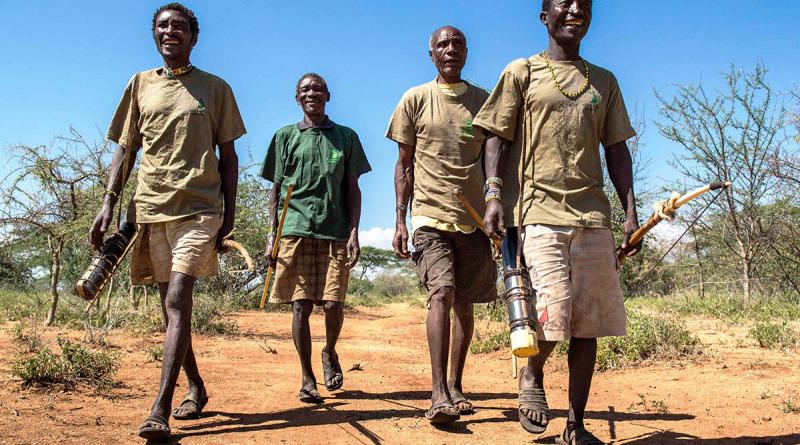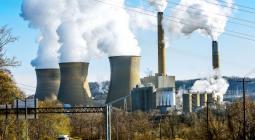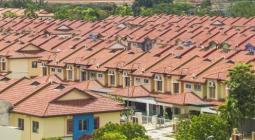Tanzania hunter-gatherers in New York City to receive 2019 Equator Prize for carbon-offset project that protects forests and earns financial rewards.

- Hadza people have lost 90% of their land to farmers and livestock herders
- $300,000 earned from carbon project pays for schools, health care
- Leading example during 2019 Climate Week of a ‘natural climate solution’
NEW YORK CITY, September 24 (Carbon Tanzania) – A community of hunter-gatherers in Tanzania who saw 90% of their land overrun by livestock and crop farmers have arrested that loss with a pioneering project that's also earned huge income from carbon offsets, and won them this year’s Equator Prize.
The Hadza have no concept of 'owning' land in the modern sense, meaning they had little legal defence against encroaching migrant farmers or cattle herders who decimated the wildlife-rich savannah woodland they need to survive.
But they adapted a legal tool never used this way before to assert their community’s title to 57,000 acres of their territory, meaning they could protect it, and enter commercial agreements to earn money from it.
With Carbon Tanzania, a social enterprise working to reframe how people earn value from natural environments, the Hadza launched the Yaeda Valley Project to trade carbon offsets from woods and forests that cover their territory.
So far, the programme has earned the community - who live in economic poverty - more than $300,000. That project's earned them the 2019 Equator Prize, to be awarded at UN HQ in New York City tomorrow Tuesday 24 September 2019.
The prize is awarded to indigenous groups by the UNDP Equator Initiative for innovative work in developing solutions to climate change and promoting sustainable development.
Ezekiel Phillipo, a representative of the Hadza community, has travelled to the US to accept the prize.
“You must understand that we Hadza, we always protect our environment because that is how we survive, so really if this carbon offset programme was not here, we would still be doing that,” Mr Phillipo said.
“But now we earn a lot of money from doing what we do anyway, protecting the forests and the animals that live in it. We are able to do many things that otherwise we could not afford, like sending our children to university, or paying hospital bills if we fall sick, or giving salaries to game scouts to patrol our forests.”
This year alone the community have sent 12 community members to be trained as forest rangers, supported 25 students as well as providing hospital treatment for 23 individuals.
Additionally, the carbon revenues have paid for a team from the regional health department to bring field clinics to the Hadza communities to test for and treat tuberculosis, common eye disorders, and other illnesses.
“There has been a very big change since the carbon programme came,” said Paulo Isaya Simon, 15, a student whose secondary school costs are covered by the Yaeda Valley Project’s education fund. “I would not be able to study if these payments were not made. Many of my agemates are also in school thanks to it. I want to become a heart doctor, and I want to open a hospital here in my community to help the Hadzabe.”
The Hadza project is only one of several that Carbon Tanzania is operating that all focus on supporting communities to obtain land rights or resource rights that result in them earning revenue from ecosystem services/environmental protection.
“This is a nature-based solution that’s helping mitigate the effects of climate change while also preserving a people's traditional way of life in a modern world,” said Marc Baker, Carbon Tanzania’s CEO and co-founder.
“It supports sustainable socio-economic development, and proves the power of cooperation between all sorts of organisations and people, from international financial experts to African local governments to conservation organisations, and most importantly, to these communities.”
From the outset, the Government of Tanzania and the the Ujumaa Community Resource Team, a local Tanzanian legal rights organization, were key to supporting the communities to securing legal land-rights over their remaining forested areas.
These land-rights take the form of a Certificate of Customary Right of Occupancy (CCRO), the first of its kind for an indigenous group in Tanzania, and a designation that reflects the Tanzanian Government’s commitment to devolving power and decision making to local communities.
Building on this landmark achievement, the Hadza collaborated further with Carbon Tanzania, the Dorobo Fund and The Nature Conservancy to create the Yaeda Valley Project, an innovative nature-based solution to climate change that delivers sustainable rural development and also contributes to biodiversity conservation.
It is a shining example of the power of co-operation between a variety of actors who bring different strengths, skills and resources to create an open, transparent and empowering environment for effective, locally driven conservation and sustainable development.
The project relies on the communities putting in place governance structures and practical activities to protect their traditional forest lands in order to generate carbon credits, which are sold to companies and individuals who wish to offset their carbon impacts.
23 September 2019




